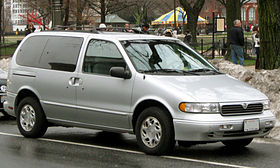| Mercury Villager | |
|---|---|
 | |
| Overview | |
| Manufacturer | Mercury (Ford) Nissan |
| Also called | Nissan Quest |
| Production | 1992–2002 |
| Assembly | United States: Avon Lake, Ohio (Ohio Assembly) |
| Body and chassis | |
| Class | Minivan |
| Layout | FF layout |
| Platform | Ford VX54 platform |
| Related | Nissan Maxima (J30) |
| Chronology | |
| Successor | Mercury Monterey |
The Mercury Villager is a minivan that was marketed by Mercury from 1993 to 2002. Taking its name used by Mercury to denote its wood-trimmed station wagons, the Villager was developed in a joint venture between Ford and Nissan; the latter manufacturer marketed the line as the Nissan Quest. The first front-wheel drive van produced by Ford, the Mercury Villager was introduced between the Ford Aerostar and the Ford Windstar, competing against Chrysler minivans and the General Motors APV minivans.
Two generations of the model line were produced, with the Villager undergoing a full redesign for 1999. In a first for the minivan segment, the model line replaced a removable rear seat with a design that was repositionable (dependent on passenger or cargo use). The Villager was the last Mercury developed with the lightbar grille used by the brand.
The Villager was produced alongside the Nissan Quest by Ford at its Ohio Assembly facility (Avon Lake, Ohio) alongside the Ford Econoline/Club Wagon. After 2002, the Ford-Nissan joint venture ended, with both companies developing minivans on their own. Nissan released a new generation of the Quest, while the Villager was replaced entirely; for 2004, Mercury released a revived Monterey as its second minivan (a divisional counterpart of the Ford Freestar).